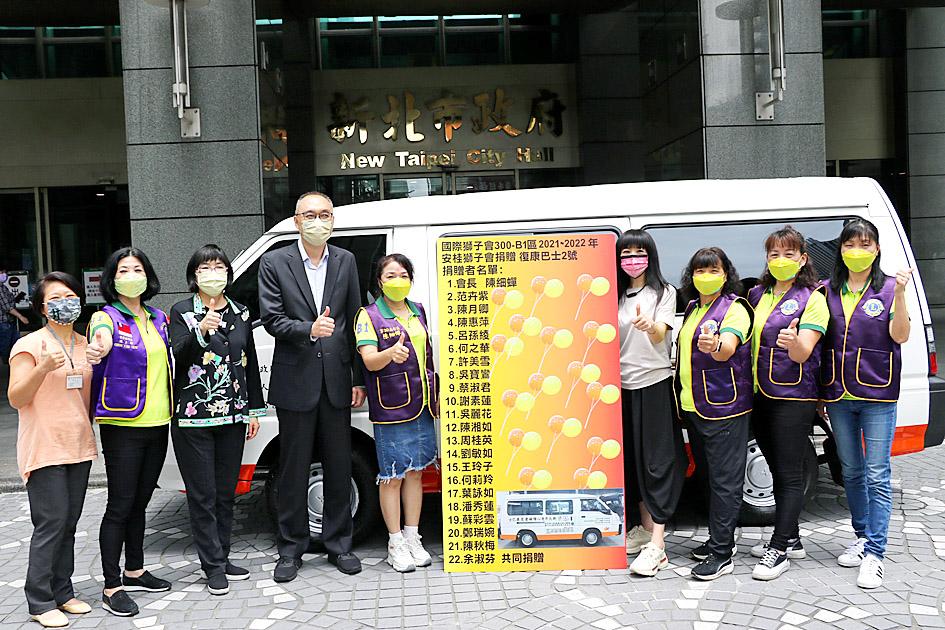The Taiwan chapter of Lions Clubs International (LCI) recently fended off a hostile bid to exclude Taiwan from the international service group’s proceedings, a senior club member said yesterday, urging members to remain vigilant against Chinese meddling.
Earlier this month, the representative of LCI Hong Kong asked a meeting of the international chapters in Hawaii to give China control over club affairs in Taiwan, said Chiu Wen-bin (邱文彬), a former international director of LCI Taiwan.
The Taiwan chapter — which was holding a major convention in Tainan at the time — immediately moved to condemn the measure in a unanimous vote, he said, adding that LCI shortly afterward rejected the proposal.

Photo: Lai Hsiao-tung, Taipei Times
When the first Chinese Lions Club was set up in Guangdong Province in 2002, it tried unsuccessfully to force the name “China Taiwan” on the Taiwanese chapter, he said.
China’s second attempt to force the name on Taiwan in 2019 encountered stiff opposition when Japan, South Korea, Australia and several other national chapters joined Taiwan in rejecting it, he said.
Taiwanese members should be on the alert when the local chapter holds its election for international director next month, as Beijing might try to meddle by inserting an agent in the race, he said.
“Lions clubs are opposed to any interference from political or religious groups in their internal affairs,” he said. “We must make sure to elect a candidate who has a clean record under LCI rules and ethics, is of good moral character and possesses Taiwanese consciousness.”
National Tamkang University associate professor of public administration Chen Chih-wei (陳志瑋) said that the LCI incident is emblematic of the role and function of China’s nonprofit groups.
“Nonprofits are treated definitionally as outgrowths of civil society in Taiwan and most other countries,” he said. “However, in China, nonprofit groups function as instruments of state power, despite the rapid growth they have experienced in the past 20 years.”
Although nonprofit groups enjoy limited autonomy in the realm of culture, social welfare and other soft activities, they exist only on condition that they acquiesce to political control, he said.
Wu Rwei-ren (吳叡人), an associate research fellow at Academia Sinica’s Institute of Taiwan History, said that Beijing has long made a strategy of interfering with any international group in which Taiwan is a member.
The more a Taiwanese group contributes to an organization, the more Beijing will take steps to undermine it, he said, adding that LCI Taiwan is not alone in feeling threatened.
Institutions can use legal mechanisms to protect themselves, he said, citing for example the group’s charter that binds its representatives to adhere to Taiwan’s position on sovereignty in any dealings with outside groups.

Chinese Nationalist Party (KMT) Chairman Eric Chu (朱立倫), spokeswoman Yang Chih-yu (楊智伃) and Legislator Hsieh Lung-chieh (謝龍介) would be summoned by police for questioning for leading an illegal assembly on Thursday evening last week, Minister of the Interior Liu Shyh-fang (劉世芳) said today. The three KMT officials led an assembly outside the Taipei City Prosecutors’ Office, a restricted area where public assembly is not allowed, protesting the questioning of several KMT staff and searches of KMT headquarters and offices in a recall petition forgery case. Chu, Yang and Hsieh are all suspected of contravening the Assembly and Parade Act (集會遊行法) by holding

PRAISE: Japanese visitor Takashi Kubota said the Taiwanese temple architecture images showcased in the AI Art Gallery were the most impressive displays he saw Taiwan does not have an official pavilion at the World Expo in Osaka, Japan, because of its diplomatic predicament, but the government-backed Tech World pavilion is drawing interest with its unique recreations of works by Taiwanese artists. The pavilion features an artificial intelligence (AI)-based art gallery showcasing works of famous Taiwanese artists from the Japanese colonial period using innovative technologies. Among its main simulated displays are Eastern gouache paintings by Chen Chin (陳進), Lin Yu-shan (林玉山) and Kuo Hsueh-hu (郭雪湖), who were the three young Taiwanese painters selected for the East Asian Painting exhibition in 1927. Gouache is a water-based

Taiwan would welcome the return of Honduras as a diplomatic ally if its next president decides to make such a move, Minister of Foreign Affairs Lin Chia-lung (林佳龍) said yesterday. “Of course, we would welcome Honduras if they want to restore diplomatic ties with Taiwan after their elections,” Lin said at a meeting of the legislature’s Foreign Affairs and National Defense Committee, when asked to comment on statements made by two of the three Honduran presidential candidates during the presidential campaign in the Central American country. Taiwan is paying close attention to the region as a whole in the wake of a

OFF-TARGET: More than 30,000 participants were expected to take part in the Games next month, but only 6,550 foreign and 19,400 Taiwanese athletes have registered Taipei city councilors yesterday blasted the organizers of next month’s World Masters Games over sudden timetable and venue changes, which they said have caused thousands of participants to back out of the international sporting event, among other organizational issues. They also cited visa delays and political interference by China as reasons many foreign athletes are requesting refunds for the event, to be held from May 17 to 30. Jointly organized by the Taipei and New Taipei City governments, the games have been rocked by numerous controversies since preparations began in 2020. Taipei City Councilor Lin Yen-feng (林延鳳) said yesterday that new measures by